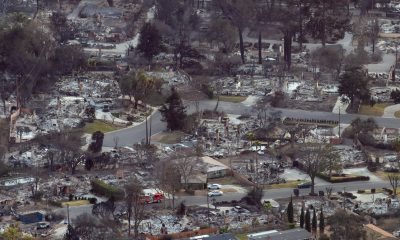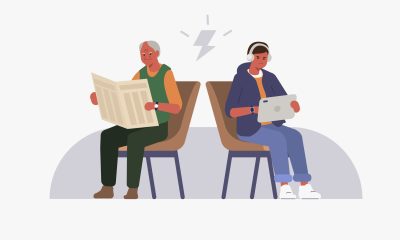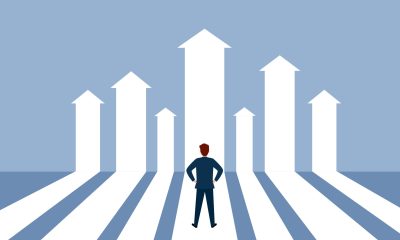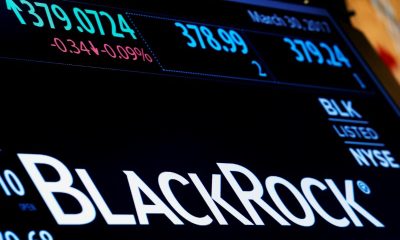Personal Finance
What is a recession? The economic concept explained. What causes and happens during one.
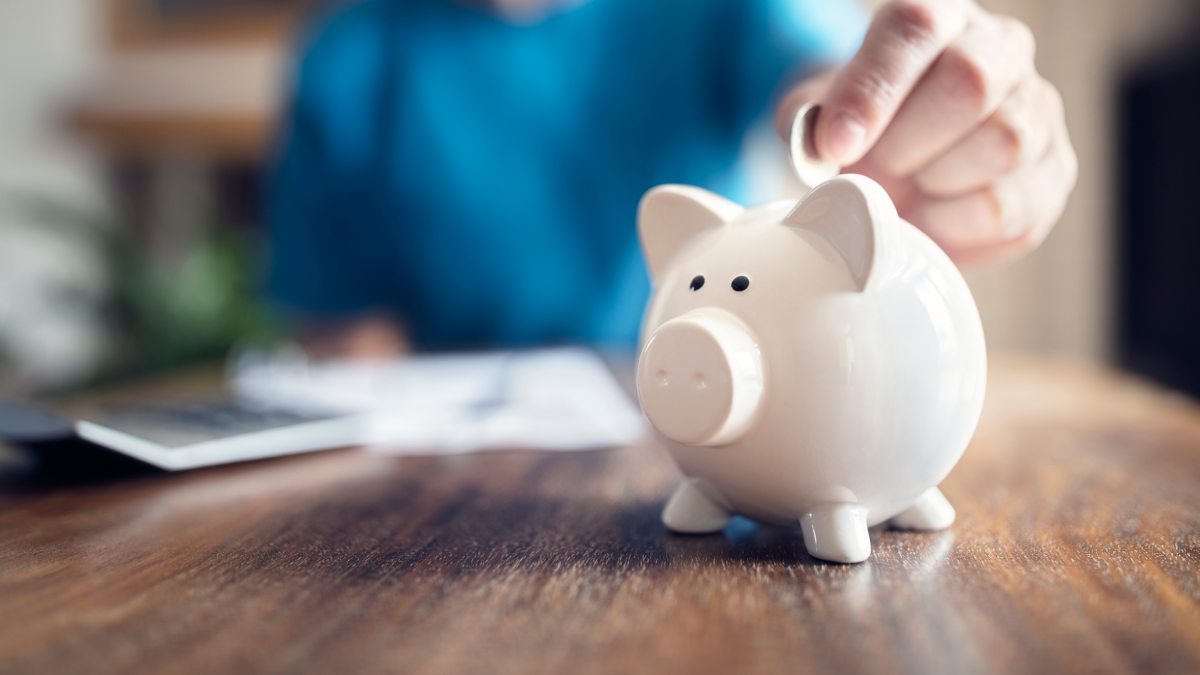
Inflation has slowed and gross domestic product has revived , but most economists still expect a mild recession this year.
In December, consumer prices rose 6.5% from a year earlier but that was down from a 40-year high of 9.1% in June. Core prices, which exclude volatile food and energy items, climbed 5.7% annually, according to the Labor Department’s consumer price index.
Another CPI report is due out Tuesday and is expected offer key insights on the state of the economy.
Meanwhile, GDP, or the value of all goods and services produced in the U.S., increased by 2.6% in the quarter that ended Sept. 30, after dropping at an annual rate of 1.6% in the first three months of the year and 0.6% in the second three, according to the federal Bureau of Economic Analysis.
Wait, are we in a recession? How to tell? Keep a close eye on unemployment, consumer spending
Computer to worker: You’re fired! Layoffs in a likely recession this year could be determined by software programs
So how could a modest downturn happen? The past two recessions were sparked by shocks to the economy – a housing crisis and a pandemic. A downshift this year would be triggered by a Federal Reserve that has aggressively raised interest rates to cool off an economy that has run too hot since emerging from the pandemic.
If a recession does happen, how will it unfold, and what does it mean for everyday life?
Here is what you need to know.
CPI report:Inflation slows slightly but prices remain high
Inflation rate: Is soaring inflation worse than the recession the Fed may trigger by aggressively fighting it?
What is a recession?
In simple terms, a recession is “a contraction in economic activity” or “when the economy shrinks,” said Sameer Samana, senior global market strategist for the Wells Fargo Investment Institute.
To be more specific, a recession is “a significant decline in economic activity that spreads across the economy and lasts more than a few months,” said Michael Pugliese, an economist with Wells Fargo.
In determining whether a recession has occurred, the nonprofit National Bureau of Economic Research doesn’t just look at GDP but rather at a variety of indicators such as employment, consumer spending, retail sales and industrial production.
When it comes to defining a recession, it could be a technical recession or a true recession, said Samana.
“The biggest distinction is the severity,” he explained. “A technical recession is more of a mathematical downshift. A true recession is a more meaningful contraction across a broader range of categories.”
Just Curious: We’re here to help answer life’s everyday questions.
Is it too late to prevent a recession? Here’s what experts say
Is there a recession coming in 2023?
Economists are giving 65% odds of a recession this year, but 97% of them reckon it will be mild, according to a survey this month by Wolters Kluwer Blue Chip Economic Indicators. That means it will look more like recessions in the early 1990s and early 2000s than the two most recent episodes.
What is a mild recession?
A mild recession could cost the economy 1.8 million jobs if the nation’s gross domestic product, or economic output, declines 1.2%, and the unemployment rate rises from a 50-year low of 3.5% to 5.4%. The national unemployment rate rose from 3.5% to 3.7% in October even though hiring remained strong amid recession fears.
What is a severe recession?
A severe recession could mean 3 to 4 million job losses, a 2% to 2.5% decline in GDP, and a 7% unemployment rate. The “Great Recession” lasted from December 2007 to June 2009, which was the longest economic downturn since World War II, according to the Federal Reserve.
When is a recession going to hit? Next year is becoming more likely and it could be more severe.
What happens during a recession?
During a recession, the economy shrinks as a result of a pullback on individual spending, said Samana.
“Consumption, consumer spending makes up about 70% of the U.S. economy,” he said, explaining that during a recession, the cutback in spending “then feeds into overall demand for services.”
From this, companies can pull back on the number of people they employ, further contributing to the contraction of economy activity. Unemployment often rises during recessions, and total employment levels can flatline or turn negative, said Pugliese.
In addition, GDP growth tends to shrink during recessions because there’s less consumer demand and fewer employees, leading to lower production of goods and services.
“If you have fewer employees, all else equal, you’re going to potentially produce less in a recession,” Pugliese said. “All of these things are tied together. Most of those indicators are either slowing down in growth terms, or in many cases, contracting.”
Wages are also affected by recessions, said Samana.
“It’s harder to argue for wage increases,” he explained. If unemployment is high, employers could deny the salary request and claim a worker could be replaced by someone else for a lower wage, instead of a higher one.
Much like other goods and services, housing prices also can decrease during a recession, he said.
Possible housing recession? US home sales slide almost 6%, fueling speculation that the market is in a ‘recession’
Stagflation vs recession: What’s the difference?
What about layoffs if a recession happens in 2023?
There’s little doubt there will be some pain as hundreds of thousands of workers likely lose their jobs. Already, a wave of tech layoffs has hit that industry.
As a result of those job losses, those still employed will worry they might get laid off themselves and pull back spending. And the hottest job market on record will cool off, leaving workers with fewer opportunities and putting a damper on job hopping.
But don’t expect the trauma of the past two recessions, which each threw millions of people out of work. Yes, the job market will almost certainly weaken in the coming months, but it probably won’t come to a standstill, economists say.
Employers added a sturdy 223,000 jobs in December as unemployment matched a 50-year low of 3.5%, though job growth has slowed from a monthly average of more than 400,000 earlier last year.
Tracking tech layoffs:Why companies like Amazon and Meta cut jobs in 2022
Is there going to be a richcession?
We could end up having a richcession, the trending term coined by Wall Street Journal reporter Justin Lahart in January to describe a recession that disproportionately hurts rich people.
He argues that a richcession could be brewing because household wealth for those at the top didn’t grow as much as it did for those at the bottom, percentage-wise, over the course of the pandemic.
Wealth on the bottom grew as a result of stimulus checks and other government stimulus money as well as wage increases to try to keep up with inflation and attract workers in a historically-tight labor market. Wealth at the top, meanwhile, is stagnating because paychecks aren’t rising and the stock market’s decline over the past year is hitting the wealthier especially hard.
The rich don’t get richer:Term coined by reporter hints at new type of recession in 2023.
How long do recessions last?
To be categorized as a recession, an economy must experience a couple of back-to-back quarters of shrinking output, said Samana.
However, there is no definite timeframe for how long a recession must last, and the length of a downturn can vary, explained Pugliese.
“You can have some that are very short and quick. You could have others that are a lot more long-lasting.”
Biden on recession: Rejects recession label, declares nation is ‘on the right path’ despite shrinking economy
Who suffers the most during a recession?
Anyone can be impacted during a recession, said Samana, such as lower-income people or unskilled laborers.
It is hard to generalize that one group may experience a greater impact more than others, said Pugliese. During the 2020 recession due to COVID-19, the hardest hit industries were leisure and hospitality, but in the 2001 recession, the tech industry struggled, he explained.
“I think it just depends a lot of what’s driving the slowdown in the first place,” said Pugliese.
Read more: How inflation’s wrath, recession fears are heading into middle, upper, class America
Fed hike impact: With next Fed interest rate hike due this week, we answer your top financial questions
What happens to inflation during a recession?
Historically, when the economy has slowed, inflation appears to remain high.
But as a recession sets in, inflation will begin to fall. This can occur after a quarter or two of economic contraction, said Samana.
Update your settings here to see it.
“The tricky part this time around is how much does it come off,” he said. “How it should work is the economy would need to roll over first; people would need to feel the impacts of that rollover. They’ll probably start to rein in their spending, which will then start to filter into those prices.”
ICYMI: Highest inflation rates by US cities and metro areas, ranked
What is inflation? Understanding why prices rise, what causes it and who it hurts most.
What should you buy before a recession?
It’s not a bad idea to stock up on household goods and shelf-stable foods now while you still have a regular paycheck if you’re afraid you won’t have one in a couple of months.
But make sure to not get carried away.
You may also want to try to pay off as much debt as possible, particularly any high-interest debt.
Is U.S. already in a recession? If GDP falls for second quarter, one definition says we are
Recession in 2022? Some top economists say a recession is growing more likely, but it probably would be mild
What should you avoid doing in a recession?
In a recession, spending should be monitored. Try to avoid frivolous spending and going off budget.
Additionally, if possible, try to avoid taking on more debt.
What to avoid, what to buy? How to financially prepare for 2023 — in case of recession.
Should you buy a home during a recession?
Americans are split on whether they would buy a home during a recession, according to a study by Cinch Home Services, a warranty company.
The National Association of Realtors defines a housing recession as when home sales drop for six straight months. In September, existing-home sales declined for the eighth consecutive month, and sales were down almost 24% from a year ago.
The median existing-home sales price rose 8% year-over-year to $384,800 in September, but it was also the third month in a row that prices declined after reaching a record high of $413,800 in June.
Nearly half of Americans surveyed in the Cinch study said that they would “more likely” buy a home in the event of a recession.
However, 42% of American homeowners polled in the Cinch survey said they would be less likely to buy a home during a recession and 14% said a recession would not impact their plans to buy a home. Among those participating in Cinch’s survey, 72% were homeowners, 24% were renters and the remaining 4% were living somewhere without making a payment.
What is a rolling recession?
While a recession is a decline in economic activity across the board, a rolling recession impacts certain regions or industries more than others. While some sectors experience downturns, the national economy may continue to grow, according to the Federal Reserve Bank of San Francisco.
According to Charles Schwab economists, we are already in a rolling recession. For example, many economists believe the housing market and manufacturing are both in recession territory.
Are we in a rolling recession?: Why economists think we are.
More of your Money questions answered
-
How much money do you need to retire? And when should you start to save?
-
How to buy stocks: A basic introduction for first-time investors.
-
What are meme stocks? How online communities use social media to outsmart the market.
-
What is a recession? The economic concept explained and what happens during one.
-
What is inflation? Understanding why prices rise, what causes it and who it hurts most.
-
Housing market grinding to a halt? High mortgage rates bring sales and listings down
-
Mortgage rates top 7%. Is a fixed or an adjustable rate the best bet right now?
-
When does FAFSA open for 2023-24? Apply for financial aid now with this step-by-step guide
-
Housing market first-timer? 15+ real estate terms you should know, from FICO to escrow
-
How to prepare now that student loan forgiveness likely isn’t coming any time soon
Contributing: Clare Mulroy
This article originally appeared on USA TODAY: What is a recession? A guide to the economic concept and what it means
Read the full article here

-

 Side Hustles5 days ago
Side Hustles5 days agoMicrosoft Is About to Begin Job Cuts. Here’s Why.
-

 Make Money4 days ago
Make Money4 days ago10 Critical Questions to Ask Your Financial Advisor Now
-

 Make Money3 days ago
Make Money3 days ago10 Ways to Make Money As a Graphic Designer
-
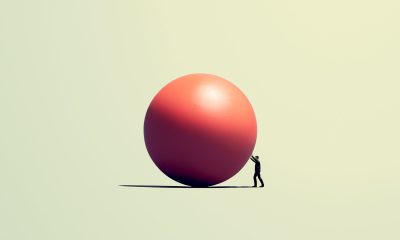
 Passive Income6 days ago
Passive Income6 days ago3 Challenges Entrepreneurs Will Face in 2025
-

 Investing5 days ago
Investing5 days agoWhat CMOs Need to Know About AI Adoption in Marketing Teams
-
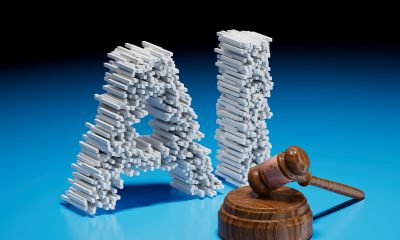
 Side Hustles6 days ago
Side Hustles6 days agoThe Canadian Media Lawsuit That Could Reshape Tech’s Future
-

 Side Hustles5 days ago
Side Hustles5 days agoJPMorgan to Implement a Five-Day Return-to-Office Mandate
-

 Passive Income5 days ago
Passive Income5 days ago3 AI Leadership Lessons for 2025

